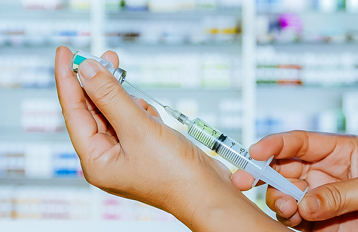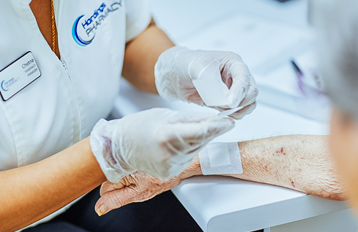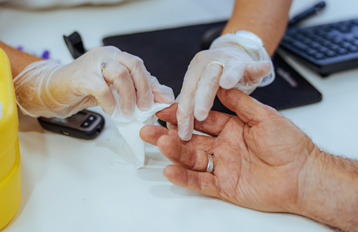Flu vaccinations
Annual vaccination is the most important measure to prevent influenza and its complications. It is recommended for all people aged 6 months and over. Influenza (flu) vaccines are given each year to protect against the most common strains of the virus.
Why is flu vaccination important?
The flu is a highly contagious respiratory infection that can cause severe illness. By getting vaccinated, you not only reduce your risk of serious illness but also help prevent the disease from spreading to vulnerable people.
Who should get vaccinated against influenza?
Vaccination against influenza is recommended for everyone aged 6 months and over. Patients in all states except QLD can be vaccinated in a community pharmacy from age 5. In QLD, pharmacists can vaccinate infants from 6 months of age.
Some people are eligible to get the flu vaccine for free under the National Immunisation Program (NIP). Community pharmacists can administer free flu vaccination to the following groups:
You can find information about NIPVIP (National Immunisation Program Vaccinations in Pharmacy) vaccines on the Department of Health and Aged Care website. In some states and territories, flu vaccines may also be provided for free to people not listed above. Speak to your local community pharmacist or contact your state or territory health department to find out more.
If you’re not eligible for a NIPVIP funded flu vaccine, a community pharmacist can still administer your vaccine and may charge a fee.
When should I get vaccinated?
Flu season generally runs from May to October each year, but the timing of peak flu season can vary by geographic location and from one year to the next. The peak period of circulation of the flu usually occurs from June to September in most parts of Australia.
Ideally, you should receive your annual flu vaccination before the start of the flu season, with optimal protection occurring in the first three to four months following vaccination.
If you are planning international travel, ensure you have had your vaccination at least two weeks before departure, or at your earliest opportunity.
Flu vaccines and COVID-19
It’s safe to have a flu vaccine when you’re also receiving another vaccine – like COVID, and your pharmacist can take care of both.
Allergy advice
Some vaccines contain minute traces of egg but are still safe for people with egg allergy, including anaphylaxis. If you have an allergy, you can discuss it with the pharmacist administering your vaccine. If you have previously experienced an allergic reaction following a flu vaccine, you should not receive a flu vaccine.
COVID-19 vaccinations
Community pharmacists across Australia are offering convenient COVID-19 vaccination services.
Available vaccines
- Pfizer - vaccines available for patients 5 years and older
Understanding COVID-19
COVID-19 is a respiratory disease caused by the SARS-CoV-2 virus, belonging to the coronavirus family. Symptoms include fever, cough, sore throat, and shortness of breath. While most cases are mild, severe illness can occur.
Preventing spread
You can help slow the spread of COVID-19 by:
COVID-19 and flu vaccines
It’s safe to have a COVID-19 vaccine when you’re also receiving another vaccine – like the influenza vaccine, and your pharmacist can take care of both.
All COVID-19 vaccines and boosters are free for everyone.
Find a pharmacy near you offering flu and COVID-19 vaccination services.
Additional flu & covid-19 resources:
- Visit the National Centre for Immunisation Research and Surveillance (NCIRS) website for additional vaccination information and resources.
OUR SERVICES What We Offer

Everyday health
Your local community pharmacy is your go-to destination for everyday health needs. From coughs and colds to travel health and mobility care, your community pharmacists can do more for you with expert advice and effective treatments to help you stay healthy and active. Explore our range of services to keep your family well every day.

Vaccination
Your community pharmacist can do more for you with a wide range of vaccines available, from flu and COVID-19 to essential travel immunizations. Visit your local pharmacy to stay healthy, protected, and up-to-date with your vaccinations.

Skin
Your community pharmacist is here to help you care for your skin, from managing common conditions like school sores, eczema, and acne to offering guidance on wound care, shingles, and sun protection. Visit your local community pharmacy for expert advice and effective solutions to keep your skin healthy every day.

Women's health
Community pharmacists are enhancing women’s health by providing comprehensive support at every stage – from conception and contraception to bone health and beyond.

Harm reduction & dependency
Your community pharmacist is here to help with harm reduction and dependency, offering support, resources, and more.

My medicines
Get expert support with your medications through comprehensive reviews and management services provided by your community pharmacist. From home medicine reviews and MedsCheck consultations to dose administration aids and staged supply, we’re here to help you every step of the way.

Chronic conditions
Get the support you need from your community pharmacist to manage chronic conditions. With expert advice, personalised medication management and tailored health services, community pharmacies empower you to take control of ongoing health challenges and improve your quality of life.

Testing & screening
Take control of your health with convenient testing and screening services at your community pharmacy. From regular monitoring to early detection, these essential services help identify potential health risks and support proactive care. Your pharmacist is here to guide you in staying informed and making health-conscious decisions for a healthier future.



